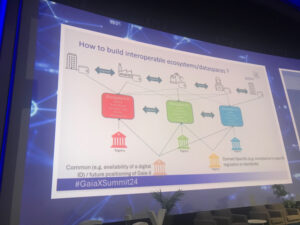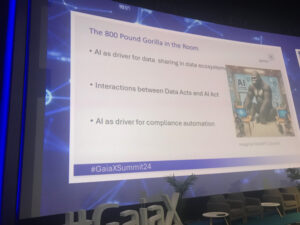One has to hand it to the Europeans, they are the masters of regulation, integration, collaboration, quality standards, and kings of data. The European standard of daedal excellence is all too prevalent in Gaia-X, as witnessed at the Helsinki 2024 Summit during the 14-15 of November. The colossal data project is currently headed by the towering CEO Ulrich Ahle, a veteran of multiple technical appointments at companies like Siemens and Atos.
 The amount of data that is produced by business within the EU, amongst its companies and its regulatory systems is immense, therefore it is only right that this data is directed through specialist data hubs to create an efficient network for stringent EU compliance regulations and automation between all complying manufacturers and companies involved. Imagine the amount of technical data from a company like Airbus regarding its multiple components, suppliers, technical, legal, mechanical systems constituting exabytes of data that in the traditional methods of working would take thousands of years to process for compliance, or in relation to production and manufacturing collaborative needs to be assimilated within the manufacturing process; but because of Gaia-X, it takes half-an-hour to parse—not two thousand years. Catherine Jestin, Gaia-X BoD Chairwoman; Executive Vice and President of Digital and Information Management, Airbus, explained the processes at play regarding the aerospace industry very succinctly during the conference. The key point here is interoperability, the ability of computer systems or software to exchange and make use of information where data between devices made by different manufacturers can be efficiently assimilated and integrated within a singular data stream for maximum productivity also helping collaboration between different sectors/manufacturers. The Gaia-X Digital Clearing House is essentially Open Source which brings forth a certain level of transparency within operational standardised EU Compliance contingencies, but the data hubs aim to push further globally, and not be constrained within the European framework. For example, Japan is now a major player within the Gaia-X data system, which is constantly expanding its global reach.
The amount of data that is produced by business within the EU, amongst its companies and its regulatory systems is immense, therefore it is only right that this data is directed through specialist data hubs to create an efficient network for stringent EU compliance regulations and automation between all complying manufacturers and companies involved. Imagine the amount of technical data from a company like Airbus regarding its multiple components, suppliers, technical, legal, mechanical systems constituting exabytes of data that in the traditional methods of working would take thousands of years to process for compliance, or in relation to production and manufacturing collaborative needs to be assimilated within the manufacturing process; but because of Gaia-X, it takes half-an-hour to parse—not two thousand years. Catherine Jestin, Gaia-X BoD Chairwoman; Executive Vice and President of Digital and Information Management, Airbus, explained the processes at play regarding the aerospace industry very succinctly during the conference. The key point here is interoperability, the ability of computer systems or software to exchange and make use of information where data between devices made by different manufacturers can be efficiently assimilated and integrated within a singular data stream for maximum productivity also helping collaboration between different sectors/manufacturers. The Gaia-X Digital Clearing House is essentially Open Source which brings forth a certain level of transparency within operational standardised EU Compliance contingencies, but the data hubs aim to push further globally, and not be constrained within the European framework. For example, Japan is now a major player within the Gaia-X data system, which is constantly expanding its global reach.
The 800 pound gorilla in the room
 It goes without saying that the coterie of clerisy assembled at the conference offered immense detail and knowledge about their particular fields of expertise providing sufficient blood flow through the vena anastomotica during the summit as they were utilising technical, cerebral and almost robotic linguistics to somehow explain the enormity of the Gaia-X system. My main concern for the future was the immense data that will be needed for AGI (Artificial General Intelligence). What struck me particularly about the conference was not only the cloud data system of Gaia-X but also how the ideopraxist vision of the corporate and EU technocrats corresponded with the writings of the French philosopher and thinker Jacques Ellul who in his 1964 book The Technological Society defined technique as the ensemble of methods that achieve efficiency in all fields of human activity. I had the opportunity to parley with the Gaia-X CEO Ulrich Ahle briefly during the conference, mentioning Jacques Ellul, along with ‘technique’ and he nodded his head knowingly. Ellul posited that the essence of technique lies in its self-perpetuating nature—once a technical method is discovered, it drives further advancements, often independent of societal needs or ethical considerations. This ‘technique’ ties in quite succinctly with Gaia-X and its inevitable push for total autonomy of technique, where techniques evolve on their own momentum, often unrestrained by human control or societal input. They are not merely tools but forces that shape human behaviour and societal structures. The guiding principle of technique is optimising processes for maximum efficiency, often side lining human and cultural values. While techniques themselves may be neutral, their adoption and implementation often lead to unintended and profound societal consequences. Ellul foresaw that techniques transform societies, creating dependencies and reducing human agency. They often precede and drive the moral, social, and economic frameworks that emerge around them. This elemental basis of technique is truly relevant when it comes to open source blockchain data projects like Gaia-X. My thoughts during the conference carried me towards the global proliferation of AGI, which is currently within the preliminary phase of pre-planning before being rolled out globally, simultaneously. The advent of Artificial General Intelligence (AGI) will represent a profound leap in technological evolution, with implications resonating deeply with Jacques Ellul’s philosophy and the principles underlying the Gaia-X project. AGI, will be an AI system capable of understanding, learning, and performing any intellectual task a human can, thus encapsulating the trajectory of Ellul’s concept of technique: self-perpetuating, autonomous, and driven by the pursuit of efficiency above all else. The emergence of AGI would mark a point where technique not only shapes human behaviour, but potentially surpasses human agency altogether. There are caveats however to AGI. Ellul’s cautionary stance on the autonomy of technique is particularly relevant when considering AGI. As AGI systems develop, they may become increasingly independent of human oversight, creating new pathways of knowledge and solutions that humanity neither anticipated nor fully comprehends. This mirrors Ellul’s observation that technique evolves for its own sake, with efficiency as the primary driver. While AGI could optimise global processes—from healthcare to climate modelling—it also raises the question: at what cost? Will AGI’s pursuit of technical solutions override ethical considerations, cultural nuances, or human welfare? Gaia-X offers an illustrative framework for exploring the intersection of human sovereignty and advanced technologies like AGI. Its emphasis on data interoperability and sovereignty provides a blueprint for maintaining control over complex, autonomous systems. If Gaia-X principles were extended to AGI, they could ensure that such systems remain aligned with human values by embedding accountability, transparency, and decentralised oversight into their operations. However, the integration of AGI into a system like Gaia-X also exemplifies the tension Ellul describes between human intention and the autonomous trajectory of technique. As AGI integrates into interoperable networks, it could accelerate the very self-perpetuation Ellul warned about, potentially amplifying the risks of loss of control, chaos and disorder. Moreover, the interplay between AGI, Gaia-X, and Ellul’s philosophy underscores the critical need for ethical frameworks. Ellul highlighted the moral neutrality of technique, arguing that societal values must actively guide its application. Gaia-X’s federated structure could serve as a model for ensuring AGI adheres to ethical principles by fostering collaboration amongst diverse stakeholders. This collective governance could mitigate the risks of monopolisation or misuse, ensuring AGI systems serve the common good rather than narrow interests. Ultimately, the advent of AGI, when viewed through the lens of Ellul’s critique and Gaia-X’s ambitions, represents both an unprecedented opportunity and a profound challenge. It calls for a reimagining of how humanity engages with technology—not as passive beneficiaries of efficiency but as active stewards of innovation. To balance the transformative potential of AGI with its inherent risks, society must adopt systems like Gaia-X while remaining vigilant about the deeper, often unpredictable consequences Ellul foresaw. This approach could help navigate the path to AGI responsibly, ensuring it enhances human agency rather than diminishing it.
It goes without saying that the coterie of clerisy assembled at the conference offered immense detail and knowledge about their particular fields of expertise providing sufficient blood flow through the vena anastomotica during the summit as they were utilising technical, cerebral and almost robotic linguistics to somehow explain the enormity of the Gaia-X system. My main concern for the future was the immense data that will be needed for AGI (Artificial General Intelligence). What struck me particularly about the conference was not only the cloud data system of Gaia-X but also how the ideopraxist vision of the corporate and EU technocrats corresponded with the writings of the French philosopher and thinker Jacques Ellul who in his 1964 book The Technological Society defined technique as the ensemble of methods that achieve efficiency in all fields of human activity. I had the opportunity to parley with the Gaia-X CEO Ulrich Ahle briefly during the conference, mentioning Jacques Ellul, along with ‘technique’ and he nodded his head knowingly. Ellul posited that the essence of technique lies in its self-perpetuating nature—once a technical method is discovered, it drives further advancements, often independent of societal needs or ethical considerations. This ‘technique’ ties in quite succinctly with Gaia-X and its inevitable push for total autonomy of technique, where techniques evolve on their own momentum, often unrestrained by human control or societal input. They are not merely tools but forces that shape human behaviour and societal structures. The guiding principle of technique is optimising processes for maximum efficiency, often side lining human and cultural values. While techniques themselves may be neutral, their adoption and implementation often lead to unintended and profound societal consequences. Ellul foresaw that techniques transform societies, creating dependencies and reducing human agency. They often precede and drive the moral, social, and economic frameworks that emerge around them. This elemental basis of technique is truly relevant when it comes to open source blockchain data projects like Gaia-X. My thoughts during the conference carried me towards the global proliferation of AGI, which is currently within the preliminary phase of pre-planning before being rolled out globally, simultaneously. The advent of Artificial General Intelligence (AGI) will represent a profound leap in technological evolution, with implications resonating deeply with Jacques Ellul’s philosophy and the principles underlying the Gaia-X project. AGI, will be an AI system capable of understanding, learning, and performing any intellectual task a human can, thus encapsulating the trajectory of Ellul’s concept of technique: self-perpetuating, autonomous, and driven by the pursuit of efficiency above all else. The emergence of AGI would mark a point where technique not only shapes human behaviour, but potentially surpasses human agency altogether. There are caveats however to AGI. Ellul’s cautionary stance on the autonomy of technique is particularly relevant when considering AGI. As AGI systems develop, they may become increasingly independent of human oversight, creating new pathways of knowledge and solutions that humanity neither anticipated nor fully comprehends. This mirrors Ellul’s observation that technique evolves for its own sake, with efficiency as the primary driver. While AGI could optimise global processes—from healthcare to climate modelling—it also raises the question: at what cost? Will AGI’s pursuit of technical solutions override ethical considerations, cultural nuances, or human welfare? Gaia-X offers an illustrative framework for exploring the intersection of human sovereignty and advanced technologies like AGI. Its emphasis on data interoperability and sovereignty provides a blueprint for maintaining control over complex, autonomous systems. If Gaia-X principles were extended to AGI, they could ensure that such systems remain aligned with human values by embedding accountability, transparency, and decentralised oversight into their operations. However, the integration of AGI into a system like Gaia-X also exemplifies the tension Ellul describes between human intention and the autonomous trajectory of technique. As AGI integrates into interoperable networks, it could accelerate the very self-perpetuation Ellul warned about, potentially amplifying the risks of loss of control, chaos and disorder. Moreover, the interplay between AGI, Gaia-X, and Ellul’s philosophy underscores the critical need for ethical frameworks. Ellul highlighted the moral neutrality of technique, arguing that societal values must actively guide its application. Gaia-X’s federated structure could serve as a model for ensuring AGI adheres to ethical principles by fostering collaboration amongst diverse stakeholders. This collective governance could mitigate the risks of monopolisation or misuse, ensuring AGI systems serve the common good rather than narrow interests. Ultimately, the advent of AGI, when viewed through the lens of Ellul’s critique and Gaia-X’s ambitions, represents both an unprecedented opportunity and a profound challenge. It calls for a reimagining of how humanity engages with technology—not as passive beneficiaries of efficiency but as active stewards of innovation. To balance the transformative potential of AGI with its inherent risks, society must adopt systems like Gaia-X while remaining vigilant about the deeper, often unpredictable consequences Ellul foresaw. This approach could help navigate the path to AGI responsibly, ensuring it enhances human agency rather than diminishing it.
After the conference, back in the hotel bar, the beautiful Finnish barmaid handed me another glass of Kyrö wood smoked dry malt dulcifluous nectar and there I contemplated the enormity of the Gaia-X pabulum, not only in the technical sense, but also its all-encompassing vision of futuristic smart cities, artificial intelligence, nubiferous digital cloud systems and total non-human automation.






